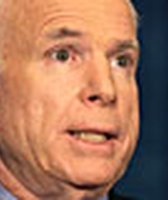Get PolitiFact in your inbox.
SUMMARY: Democrats and Republicans agree on one thing: the alternative minimum tax is catching too many people in its net. What to do about it is a little less clear.
The bogeyman in the presidential campaign, the alternative minimum tax, clutches more and more unsuspecting people. Some Republican and Democratic candidates attack it for unfairly soaking unwitting taxpayers.
But nobody is promising to altogether stop the AMT anytime soon.
The AMT is a separate income tax that was supposed to ensure that people did not use loopholes to avoid paying taxes.
The trouble is, the AMT, unlike the standard system, is not indexed for inflation.
Sign up for PolitiFact texts
Because of the law, people who are able to use deductions and legal shelters to lower their tax bill too much must pay a minimum income tax, the AMT. Under the law, taxpayers who meet the AMT threshold must pay the higher tax bill, whether it's their actual bill or the AMT.
As years passed, growing numbers of people have hit the threshold, and when they do they end up paying higher taxes. While high-income taxpayers predominate, without changes the tax will increasingly affect more middle-income people.
Here's how it started. On Jan. 17, 1969, Treasury Secretary Joseph W. Barr told Congress that 155 taxpayers making $200,000 or more did not pay any taxes on their 1966 income. (For comparison's sake, $200,000 in 1966 is nearly $1.3-million in 2007, according to government-run inflation calculators.)
That shook lawmakers into creating the alternative minimum tax in the Tax Reform Act of 1969. "You know, the alternative minimum tax was never intended to hit people who are in middle income, upper middle income. It was meant for people who are rich and evading taxes," Hillary Clinton correctly noted in the Democrats' debate on Oct. 30, 2007.
In 2006, 3.5-million taxpayers fell under the AMT, which equates to about 4 percent of American taxpayers, according to the Congressional Research Service. That brought in $24-billion in taxes. But that was with a "patch" by Congress that limited how many taxpayers are affected.
Without a change for 2007, 23.4-million taxpayers are going to be paying the AMT, sending $70-billion to the federal government, according to an estimate by the Tax Policy Center, a joint effort by the Brookings Institution and the Urban Institute.
"I don't think anybody's had a coherent proposal on the AMT. Part of the problem with the AMT is it's a problem most people don't know they have, because of the patch every year," said Tax Policy Center director Leonard Burman, former analyst for the Treasury Department and the Congressional Budget Office. And since Congress hasn't acted, he noted, they can't anticipate their tax liability for 2007, either.
Clinton and other candidates say they would cut back the AMT's growth, but the easiest answers come with a cost. Clinton has not provided details on how she would change the AMT.
Simply eliminating the tax creates a big, unappealing hole in the federal budget. Repealing the AMT would slice at least $842-billion from government coffers through 2016, according to the Congressional Research Service. So the AMT helps balance budget projections.
Another option is indexing the AMT to reflect rises in inflation, which Republicans Rudy Giuliani and Fred Thompson have backed. Indexing would put an estimated 5-million taxpayers under the AMT in 2010, generally a fifth or less of what otherwise would happen, according to CBO and Tax Center estimates.
"If we do nothing, it will impact almost 50-million Americans by 2016," Giuliani stated in a column in the Manchester Union-Leader on Sept. 5, 2007. "That's almost half of all American taxpayers. So we're going to index the AMT for inflation to stop more than 45-million more Americans from paying it in the next decade."
But that 50-million estimate only holds up if President Bush's tax cuts, which are due to expire after 2010, are made permanent.
Giuliani and the other leading Republicans favor making those cuts permanent. Clinton and other leading Democrats favor repealing parts that benefit high-income taxpayers.
According to the Tax Policy Center, 35.1-million would be affected in 2016 by the AMT if the tax cuts expire and nothing changes.
"Indexing would at least stop with that nonsense," said Steve Forbes, senior economic adviser for Giuliani.











































